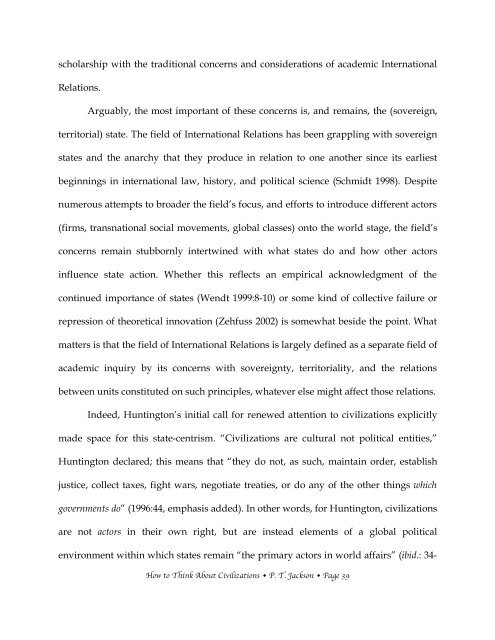How to Think About Civilizations - The Watson Institute for ...
How to Think About Civilizations - The Watson Institute for ...
How to Think About Civilizations - The Watson Institute for ...
You also want an ePaper? Increase the reach of your titles
YUMPU automatically turns print PDFs into web optimized ePapers that Google loves.
scholarship with the traditional concerns and considerations of academic International<br />
Relations.<br />
Arguably, the most important of these concerns is, and remains, the (sovereign,<br />
terri<strong>to</strong>rial) state. <strong>The</strong> field of International Relations has been grappling with sovereign<br />
states and the anarchy that they produce in relation <strong>to</strong> one another since its earliest<br />
beginnings in international law, his<strong>to</strong>ry, and political science (Schmidt 1998). Despite<br />
numerous attempts <strong>to</strong> broader the field’s focus, and ef<strong>for</strong>ts <strong>to</strong> introduce different ac<strong>to</strong>rs<br />
(firms, transnational social movements, global classes) on<strong>to</strong> the world stage, the field’s<br />
concerns remain stubbornly intertwined with what states do and how other ac<strong>to</strong>rs<br />
influence state action. Whether this reflects an empirical acknowledgment of the<br />
continued importance of states (Wendt 1999:8-10) or some kind of collective failure or<br />
repression of theoretical innovation (Zehfuss 2002) is somewhat beside the point. What<br />
matters is that the field of International Relations is largely defined as a separate field of<br />
academic inquiry by its concerns with sovereignty, terri<strong>to</strong>riality, and the relations<br />
between units constituted on such principles, whatever else might affect those relations.<br />
Indeed, Hunting<strong>to</strong>n’s initial call <strong>for</strong> renewed attention <strong>to</strong> civilizations explicitly<br />
made space <strong>for</strong> this state-centrism. “<strong>Civilizations</strong> are cultural not political entities,”<br />
Hunting<strong>to</strong>n declared; this means that “they do not, as such, maintain order, establish<br />
justice, collect taxes, fight wars, negotiate treaties, or do any of the other things which<br />
governments do” (1996:44, emphasis added). In other words, <strong>for</strong> Hunting<strong>to</strong>n, civilizations<br />
are not ac<strong>to</strong>rs in their own right, but are instead elements of a global political<br />
environment within which states remain “the primary ac<strong>to</strong>rs in world affairs” (ibid.: 34-<br />
<strong>How</strong> <strong>to</strong> <strong>Think</strong> <strong>About</strong> <strong>Civilizations</strong> • P. T. Jackson • Page 39
















